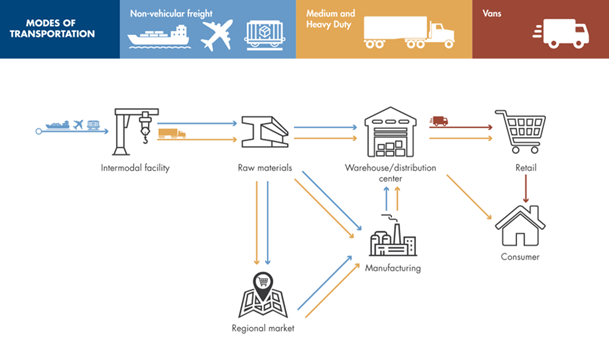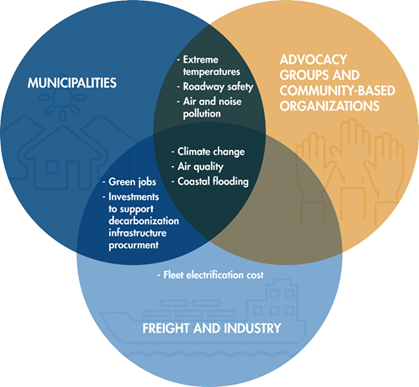The transportation sector is responsible for 37 percent of all greenhouse gas emissions in Massachusetts, making it the single greatest source of emissions in the state. Transportation decarbonization efforts can help reduce the impacts of climate change, prevent extreme weather events, slow rising sea levels, and mitigate environmental catastrophes. By reducing our dependence on fossil fuels, we can also reduce pollutants in the air, improving air quality and public health.
The Boston Region Metropolitan Planning Organization (MPO) recently published a study on freight sector decarbonization strategies to advance decarbonization efforts at the local and regional scale. The study area included parts of Chelsea, Everett, Revere, East Boston, and Winthrop. This area has long-standing industrial infrastructure, busy freight and industrial activities due to its proximity to the airport and seaports, as well as businesses and dense residential developments. Home to about 158,000 residents, the study area has a high concentration of environmental justice communities, with approximately 60 percent identifying as minorities and about 30 percent with low-income.
Three key challenges were identified in the study:
(1) Roadway conditions, congestion, and safety, as heavy traffic, particularly from medium- and heavy-duty vehicles, contributes to road deterioration, vehicular idling, and crashes involving pedestrians and bicyclists;
(2) Air quality, noise pollution, and extreme temperatures, with poor air quality, worsened by vehicle emissions and the urban heat island effect, leading to public health concerns such as increased asthma rates; and
(3) Coastal flooding, as freight hubs face risks from sea level rise, which could impact critical infrastructure and community resources.

THE KEY ACTIONS TOWARD DECARBONIZATION
In our study, we proposed several decarbonization strategies to address the aforementioned challenges:
(1) Encourage mode shift: Promoting alternative modes of transportation by investing in rail and shifting to zero-emission vehicles for last-mile deliveries, such as electric-cargo bikes (used in the “Boston Delivers” pilot program), can reduce road congestion, enhance safety for vulnerable road users, and improve air quality.
(2) Transition to electrification and alternative fuels: Fleet electrification is a commonly proposed strategy to accelerate decarbonization. Industry stakeholders expressed the need for financial programs to incentivize and support fleet replacements. While transitioning to electric vehicles and alternative fuels can significantly reduce emissions, electrification alone is unlikely to resolve concerns associated with traffic, safety, noise, and impacts on road conditions.
(3) Improve air quality reporting: Better data on local air quality can help us identify pollution sources and inform regulations, such as emission caps and anti-idling policies. Community-based organizations highlighted the need to expand reporting requirements for warehouses and other industrial activities.
(4) Enhance coordination among stakeholders: Stakeholder collaboration plays a critical role in achieving decarbonization goals. Greater collaboration at the regional, state, and national levels is needed to create effective policies and support sustainable freight activities with minimal disruption.
THE JOURNEY TO DECARBONIZATION IS NOT LINEAR
The transportation decarbonization journey requires an adaptive approach. It involves numerous stakeholders, including local governments, businesses, and community organizations, each with different and sometimes conflicting priorities. Balancing these diverse needs requires ongoing coordination. The costs of transitioning to new technologies, potential disruptions to existing businesses, and the availability of funding and incentives can influence the pace and direction of decarbonization efforts. Regulatory and policy changes also influence the process.
As part of this study, we engaged with community-based organizations, municipalities, and industry stakeholders to build relationships, identify opportunities, and understand the local and community impact of the freight sector.

FORGING A PATH TOWARD SUSTAINABLE FREIGHT DECARBONIZATION
Following up on this work, in 2025, we will study the possibility of replacing certain freight activities with electric-cargo bikes. This upcoming study will focus on the first- and last-mile connections for transporting goods and investigate whether electric-cargo bikes can be an effective alternative to step vans.
Public engagement and community buy-in are essential to successfully pursue decarbonization. Programs included in the Bipartisan Infrastructure Law, for example, offer opportunities to support ideas and enhance transportation infrastructure through competitive grants. The MPO will continue to act as a convener of regional stakeholders.
MORE INFORMATION
Read the full study report. Reach out to study authors Shravanthi Gopalan Narayanan (sgnarayanan@ctps.org) or Erin Maguire (emaguire@ctps.org) with questions.
